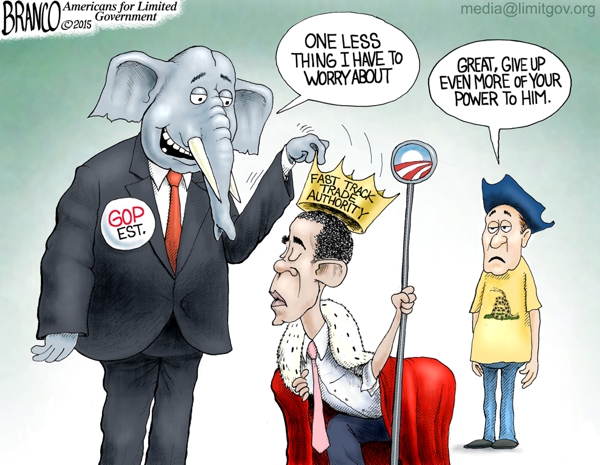Since passage of the Trade Act of 1974, every trade agreement the U.S. has entered into under trade promotion authority has not been considered a treaty under U.S. law. This includes the currently-being-negotiated Trans-Pacific Partnership between the U.S. and Australia, Brunei Darussalam, Canada, Chile, Japan, Malaysia, Mexico, New Zealand, Peru, Singapore, and Vietnam.
It is not a treaty, says the president and members of Congress; and, as such, it is not subject to a two-thirds ratification vote in the Senate. Our trade partners certainly seem to think it’s a treaty, like Australia, but let’s leave that aside for the time being.
But that is not how commercial treaties were originally treated under the U.S. Constitution.
In 1795, Supreme Court Chief Justice John Jay negotiated a commercial treaty with Great Britain, “The Treaty of Amity, Commerce, and Navigation, Between His Britannic Majesty and The United States of America.”
It was put to the Senate for ratification by a two-thirds vote, which eventually came on June 24, 1795. But not before the House of Representatives raised several objections, chiefly, that the treaty could not be binding if the House did not approve, too, since it regulated commerce with foreign nations, a power the Constitution vested in all of Congress.
Heretofore, the congressional foreign commerce power had simply been thought to include tariffs and sanctions and the like. But not treaties, which was the sole province of the president and Senate. This was a new argument and was led, oddly enough, by James Madison, the so-called Father of the Constitution and leader of the then-Republican Party in the House.
Oddly, because throughout the entire ratification process for the Constitution, nobody had considered the House would have any role in approving treaties, let alone commercial treaties.
In fact, countered the Federalist Party, if the Virginia ratifying convention, led by Madison, had thought that commercial treaties required additional House approval to be binding, then why did it propose an amendment that would have required commercial treaties to only be ratified by two-thirds of all sitting senators, rather than those present. This clearly indicated the ratifying conventions believed the treaty power also included trade agreements with foreign nations.
The matter was such a controversy that, even after the treaty’s ratification, then-President George Washington had to send a letter to the House dated March 30, 1796 to address it.
Treaties, including commercial treaties, were only to be put to the Senate for ratification, per Washington, as a matter of federalism and states’ rights. Because, he wrote, “the smaller states were admitted to an equal representation in the Senate with the larger states, and that this branch of government was invested with great powers, for on the equal representation of those powers the sovereignty and political safety of the smaller states were deemed essentially to depend.”
That is to say, the smaller states would not — and did not — agree to a Constitution where the proportionally-represented House of Representatives would have final say on treaties. Including commercial treaties.
In fact, according to Washington, at the convention a motion was made “that no treaty should be binding on the United States which was not ratified by law,” and, wrote Washington, “the proposition was explicitly rejected.”
So, everyone at the convention agreed that commercial treaties had to be put to the Senate for ratification. The state ratifying conventions, even ones that raised objections to the provision asking for a higher threshold for commercial treaties, agreed that these agreements had to be put to the Senate for ratification. The constitutional convention, which Washington chaired, even considered the question of including the House in the treaty process, and explicitly rejected it.
Thus, Washington said, “The assent of the House of Representatives is not necessary to the validity of a treaty.”
That more or less settled the matter such that when it came time for President James Madison to submit his own commercial treaty with Great Britain, the United Kingdom Commerce and Navigation Treaty of 1815, which was a free trade agreement, it too required a two-thirds Senate majority to ratify. By that time, Madison had ceded the argument.
200 years later, however, the two-thirds vote in the Senate constitutional requirement for commercial treaties is nowhere to be found.
Thanks to the Trade Act of 1974, which created an entirely new method of enacting trade agreements. It was signed into law by Gerald Ford. Now, the House and Senate authorize the President to negotiate trade deals, and then they are adopted by simple majority votes in the House and the Senate on an expedited basis — so-called fast track legislation.
Consider that not even the Madisonians denied that the two-thirds vote in the Senate was necessary. Their only quibble was that the House had no say. But they never would have considered a construction that allowed a commercial treaty to be adopted by simple majorities in both houses.
As Americans for Limited Government President Rick Manning recently noted, “Trade promotion authority via an executive-legislative branch agreement is an unconstitutional fabrication of the modern administrative state.”
Yet, every single trade agreement the U.S. has entered into for the past 40 years was somehow not considered to be a treaty, was not submitted to the Senate as such, and was adopted via this dubious process. This raises the worrisome prospect that every one of those trade deals is unconstitutional. Too bad.
The point is, members of Congress who claim fidelity to the Constitution, and to be an originalist, cannot in good conscience embrace trade promotion authority for any president. It is an aberration under the constitutional framework set forth in 1787, designed to get around the two-thirds majority requirement for treaty ratification in the Senate. Nothing more.
So stop pretending.
Robert Romano is the senior editor of Americans for Limited Government.







